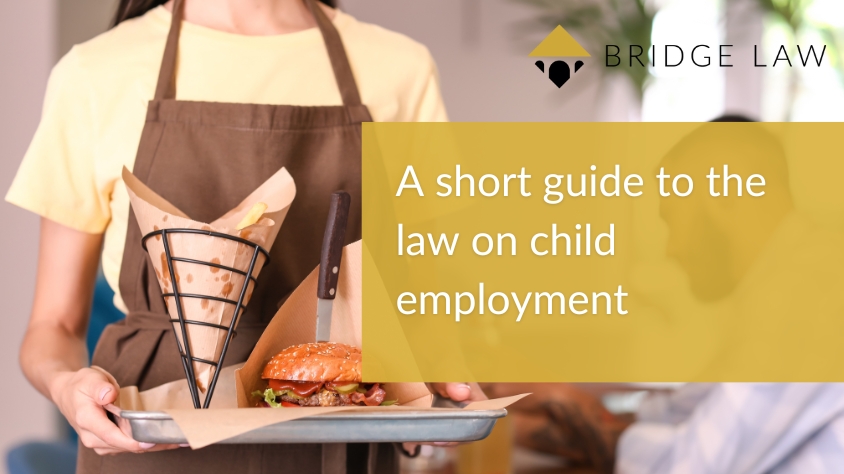A short guide to the law on child employment

The summer holidays are a popular time for young people to start seeking work and many businesses, particularly those in hospitality may be seeking extra help during the peak summer season.
If you are considering employing a minor though, there are certain laws you need to be aware of including; the minimum age children can begin working, restrictions on working hours, the type of work children are allowed to do and pay requirements. In this short guide, we’ve covered some common areas of concern for employers.
What is the minimum age a child can begin working part-time in the UK?
In the UK, to begin part-time work a child must be 13 years old or over. Children cannot work full-time until they’ve reached the school leaving age.
There is an exception for children working part-time in industries such as television, theatre and modelling though – however, the employer may need to apply to their local council for a performance licence. For children working under a performance licence, there must be appropriate supervision by a parent, teacher, home tutor or council-approved chaperone during their working hours.
At what age can someone start working full-time in the UK?
In England, young people under the age of 18 must remain in some form of education or training, the options include, staying in full-time education i.e. in college, starting an apprenticeship or traineeship or spending 20 hours or more a week working or volunteering whilst also in part-time education or training. The rules do differ in Scotland, Wales and Northern Ireland, which you can read about on the Government website.
What is the current minimum wage for children and young adults?
Under 16s
Currently, in 2023, there is no National Minimum Wage for children under 16 and because under 16s do not pay National Insurance contributions, employers don’t have to include them on payroll unless their total income within a tax year is over their personal allowance.
Over 16s
There is a minimum wage rate which applies to 16-17 year olds, the minimum wage rate increases onces a young person turns 18, when they also gain all the same employment rights as any adult worker.
The rates continue to increase with age for young workers, increasing again when a person turns 21 and 23.
Apprentice pay rates
The pay requirements for apprentices differ from the standard minimum wage and all apprentices are entitled to the current apprentice rate.
There is a standard apprentice rate for anyone aged 16-18 or 19 or over and in their first year of their apprenticeship. However, anyone over aged 19 that has completed the first year of their apprenticeship would be entitled to the current national minimum or national living wage for their age.
Yearly pay-rate changes
As an employer, it is important to ensure you remain up to date each year on minimum wage, national living wage and apprentice rate pay, as in April with each tax year the rates do change.
It’s also worth noting down your young worker birthday’s, so you remember to ensure their pay meets the minimum wage requirement for their age group.
You can visit the Government website here to find all the latest rates for the national minimum wage, national living wage and apprentice rate pay.
When you need to become a registered employer and sign up for PAYE
It is worth keeping in mind, If you employ any child or adult and pay them over £123 a week, you must be a registered employer and conduct your payroll via the PAYE system.
Legal restrictions you must comply with if employing a child
There are various legal restrictions in place to ensure children are kept safe at work and their employment doesn’t interrupt their education.
Most local council bylaws now require employers to apply for a child employment permit. This will ensure you will be insured if an accident involving the child worker occurs. You can usually check online if your local council requires a permit, or contact the local council education department if you are unsure. Currently, Kirklees Council which is the local council for Holmfirth requires a child employment permit to be issued which you can find out more about here, Stockport Council, which is the local council for Marple Bridge also requires a permit to be issued, which you can apply for here.
Legal Restrictions that apply across the UK for child employment include:
- Children cannot work in places like factories, industrial sites, pubs or betting shops. (Although they may be able to carry out a school-arranged work experience placement in a factory or industrial site).
- Children aren’t allowed to carry out any type of work that may be harmful to their health, well-being or education.
- Children cannot work during school hours, or before 7am or after 7pm on any day of the week. Children are also prohibited from working more than one hour before school, unless local council bylaws allow this.
- Children cannot work for more than 4 hours without taking at least a 1-hour break.
- During term time, children can only work a maximum of 12 hours per week, which includes up to 2 hours on school days and Sundays and up to 5 hours on Saturdays for 13-14-year-olds or 8 hours on Saturdays for 15-16-year-olds.
- During school holiday periods, 13-14-year-olds can work up to a maximum of 25 hours per week (up to 5 hours on weekdays and Saturdays and up to 2 hours on Sundays). 15-16-year-olds are allowed to work a higher maximum of up to 35 hours per week during school holidays (up to 8 hours on weekdays and Saturdays and up to 2 hours on Sundays).
- Children must also have a 2-week break from any type of work during school holidays in each calendar year.
To keep up to date with all the current restrictions the Government has put in place regarding child employment, visit the Government’s guidance on Child Employment on their website.
We recommend all employers look up their local council bylaws or contact their local council’s education department for clarity on child employment, as some councils may have specific restrictions relevant to employers in the local area. As well as some local councils requiring employers to apply for child employment permits, each local council’s bylaws also list the jobs that children under the minimum school leaving age are not allowed to do in the local district.
If you have any questions or need assistance on any Employment Law matter, please contact our specialist team on 01484 442 700 (Holmfirth office) or 0161 427 0084 (Marple Bridge office).
Written by Nikki Sharpe

Child employment, Employment Law, Employment Law for Business
